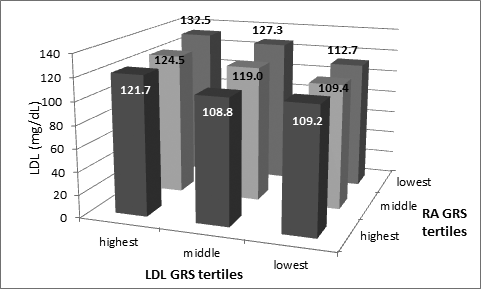Session Information
Session Type: Abstract Submissions (ACR)
Associations between lipid and rheumatoid arthritis genetic factors, and low density lipoprotein levels in RA patients
Background/Purpose:
In epidemiologic studies, low density lipoprotein (LDL), a major risk factor for cardiovascular disease (CVD), is lower in RA patients than the general population; despite this RA patients have a higher risk of CVD. Recently, the genetic determinants of LDL in the general population have been elucidated. We hypothesized that these LDL genetic factors are associated with higher LDL levels in RA and further, that RA genetic factors also influence LDL levels.
Methods:
We studied an RA cohort of 1837 subjects based in a large academic center. We genotyped subjects’ blood samples for published alleles associated with higher LDL levels (26 alleles) and RA risk (48 alleles including HLA shared epitope). To study associations between genetic factors and LDL levels, we created LDL and RA composite genetic risks scores (GRS): an aggregate count of the number of LDL and RA alleles for each individual. We selected the 1st LDL measurement in the electronic medical record as the outcome and excluded subjects with ≥1 statin prescription prior to the 1st LDL. We tested the associations between the LDL GRS and LDL, and the RA GRS and LDL levels by fitting separate linear regression models adjusted by age, gender and LDL measurement year. To determine whether RA genetic factors in aggregate were independently associated with LDL, we fitted a linear regression model with both the LDL and RA GRS, adjusted by age, gender and LDL measurement year. We further stratified each model by gender.
Results:
1072 RA subjects had LDL measured prior to a statin prescription. Characteristics: 81% female, 68% ACPA positive, mean LDL 119 mg/dL. We observed a significant association between the LDL GRS and higher LDL (p=8.0×10-4); carriage of 1 additional LDL allele was associated with a 2.3 mg/dL increase in LDL. The RA GRS was not associated with LDL in all RA cases, however the association was significant among female RA cases: carriage of 1 additional RA risk allele was associated with a 0.75 mg/dL decrease in LDL (p=0.03) (FIGURE). Among female RA cases, the RA GRS remained significantly inversely associated with LDL (p=0.02) when added to a model with LDL GRS.
Conclusion:
LDL genetic factors were significantly associated with higher LDL levels in RA cases. Our finding that RA genetic factors were significantly associated with lower LDL levels in female RA cases provides a genetic link to epidemiologic observations of lower LDL levels in RA compared to the general population.
Figure. Mean LDL levels among female RA cases grouped by tertiles of LDL and RA genetic risk scores (GRS).
[Note: Subjects in the highest LDL GRS tertile carry the highest number of LDL alleles; similarly subjects in the highest RA GRS tertile carry the highest number of RA risk alleles in the cohort. No significant interaction was observed between RA GRS tertiles and LDL GRS tertiles. ]
Disclosure:
K. P. Liao,
None;
D. Diogo,
None;
T. Cai,
None;
J. Cui,
None;
R. N. Guzman P.,
None;
V. Gainer,
None;
S. N. Murphy,
None;
S. Churchill,
None;
I. Kohane,
None;
E. W. Karlson,
None;
R. M. Plenge,
None.
« Back to 2012 ACR/ARHP Annual Meeting
ACR Meeting Abstracts - https://acrabstracts.org/abstract/associations-between-lipid-and-rheumatoid-arthritis-genetic-factors-and-low-density-lipoprotein-levels-in-ra-patients/

